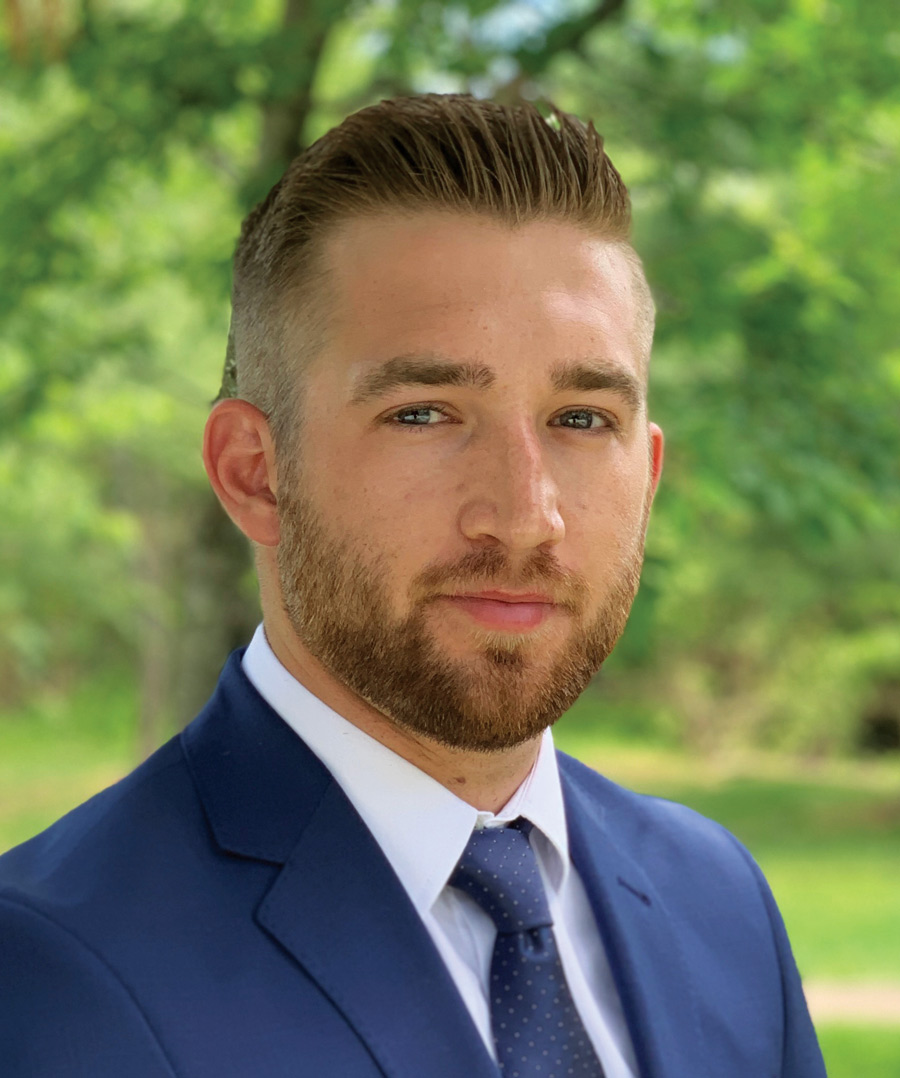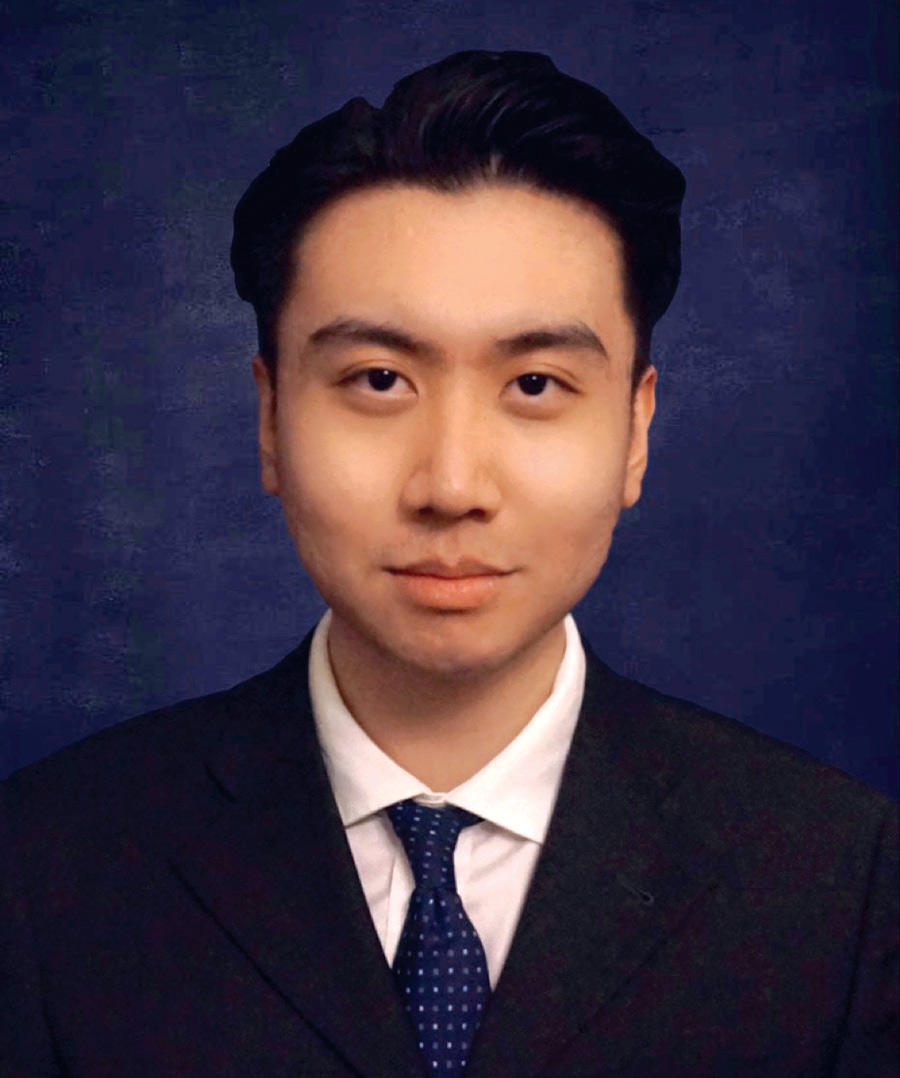

 Caleb Greene L’24 (left) and Harvey Lou L’24 had eye-opening experiences as Weil Legal innovators.
Caleb Greene L’24 (left) and Harvey Lou L’24 had eye-opening experiences as Weil Legal innovators. Caleb Greene L’24 (top) and Harvey Lou L’24 had eye-opening experiences as Weil Legal innovators.
Caleb Greene L’24 (top) and Harvey Lou L’24 had eye-opening experiences as Weil Legal innovators.Weil Legal Innovators Program Helps Students Pave Legal Career Paths
Confronting death and racial injustice was a real eye-opener for a guy from a two-stoplight, white, middle-class town named Liberty, Indiana: population 2,000. The new Weil Legal Innovators (WLI) program, sponsored by Weil, Gotshal & Manges LLP, gave Greene this growth opportunity during its first year of operation. The philanthropic initiative provides funding for students at participating law schools to defer their first year of study to work at one of WLI’s partner nonprofit organizations.
Greene chose the Aspen Institute, a venerable organization committed to change through the Aspen Challenge and the Aspen Young Leadership Fellows (AYLF) program. Through the Aspen Challenge, the Institute invites speakers to challenge high school students in a particular city to undertake projects for civic betterment. In Miami this past year, for instance, students were charged with cleaning up beaches, improving financial literacy, and creating a mental health app. In the Fellows program, college students receive resources and technical assistance to design initiatives that address pressing issues and foster community change.
Since both programs are perennially short-staffed, Greene acted as a quasi-administrator, writing a risk and liability plan for the Challenge that included a contract covering COVID-19 protocols and other areas of concern. For the AYLF, Greene recruited students, created a quarterly newsletter, managed virtual seminars and the curriculum, and even oversaw COVID-19 testing.
Greene said he had little exposure to marginalized communities before he left rural Indiana for Louisiana State University, where he was Editor-in-Chief of the school newspaper. In Baton Rouge, he encountered a much more diverse population than in his hometown and even taught English to non-native high school students from a poor section of the capital city. One day, a student told him he had suffered domestic abuse in his home growing up, leaving Greene lost for words.
For Greene, the Weil program was a form of continuing education. Over the past year, sparked by a reading of Martin Luther King Jr.’s “Letter from Birmingham Jail” on segregation in the South, Greene and Aspen fellows in St. Louis engaged in many pointed, difficult discussions about racism in America. Greene also offered support to a grieving student who lost his parents.
In the past, Greene said he had been a passive observer in such conversations. Not anymore. “I’ve become more comfortable with being uncomfortable with those discussions,” Greene said.
Harvey Lou L’24, who joined Greene at the Law School in August, had a similarly productive year with Weil, perhaps finding a vocation in the process. Lou worked with Earthwatch, which addresses environmental issues on the national and local levels. Lou participated in “Operation Healthy Air” — a continuation of his environmental work in college related to clean water solutions in East Africa.
Operation Healthy Air is a program that educates corporations, universities, schools, and communities, giving them the tools and resources to fight poor air quality close to home and around the world.
As an impact manager, Lou assisted in the creation of corporate social responsibility programs and action plans for business consulting giant Ernst & Young and aluminum multinational Alcoa. In addition, he coordinated “Ignite,” a program through which high school students accompany researchers in the field.
“It was one of the most unique experiences during my fellowship,” said Lou, “in that I got the chance to experience what scientists do on a day-to-day basis. And, more importantly, got a chance to motivate teenagers to pursue their passions … and become the future leaders of their profession.”
Lou entered the Weil program with the idea of studying transactional law in law school. Now he’s interested in environmental advocacy.
“It really opened my eyes in terms of redefining my career path, as well as areas of research that I wish to pursue in law school,” said Lou, who learned that air quality can vary from neighborhood to neighborhood. Lou is now considering joining environmental student groups and participating in the Moot Court for Environmental Law.
Lou immigrated to the United States from China in 2004 at age six. Like a young paralegal, he frequently read and translated property tax and other legal documents for his parents, who learned English at a slower pace. He got a taste of the law as a juror on Teen Courts where young people judge peers who committed misdemeanors or other minor offenses, and now finds himself in law school.
Lou, who graduated from the University of Texas at Austin, said the interdisciplinary program at the University of Pennsylvania Carey Law School and the ability to take classes at Wharton attracted him. He also noted the school’s evident collegiality.